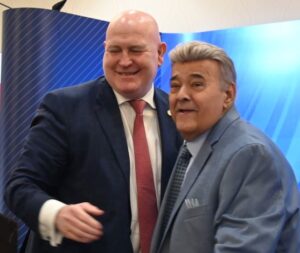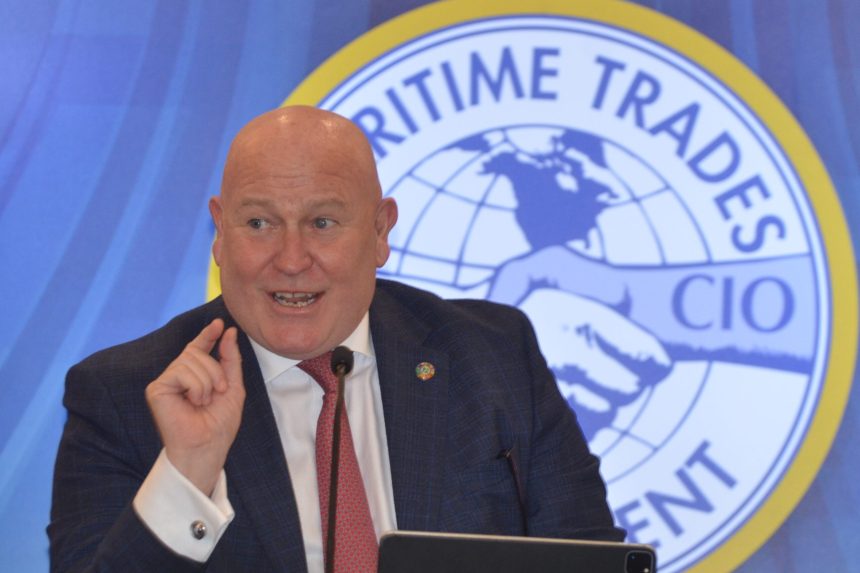
The head of the International Transport Workers’ Federation (ITF) offered valuable insights about the maritime labor shortage, the importance of cabotage laws, and how decarbonization will affect transportation employees worldwide, among other key topics.
In his remarks to the MTD Executive Board on February 17, ITF General Secretary Steve Cotton also praised the career of outgoing MTD President Michael Sacco. (In addition, Sacco announced his retirement as president of the Seafarers Union on February 14.)
Cotton stated, “On behalf of the 20 million transport workers affiliated with the ITF, we recognize Mike Sacco’s contributions – not just to the maritime trades, but to the Labor Movement…. I can say on behalf of the hundreds of thousands of seafarers Mike and the SIU have helped by being a guiding light for democracy, many (foreign) unions visited the SIU. They’ve built their constitutions around the democracy that North America represents. That’s Mike’s commitment to the international movement. He’s not just the dean of the AFL-CIO; he’s the dean of the world.”
Cotton then congratulated new MTD and SIU President David Heindel, who has served as an ITF official for many years. “On behalf of the ITF, we’ll be by your side, all the way,” Cotton said. Heindel has served as the chair of the ITF Seafarers Section since 2010.
After updating attendees about the federation’s ongoing efforts to protect workers from COVID-19, Cotton talked about the “global impact” of the labor shortage, not just in the transportation trades but in virtually every industry.
He stated, “Many people are looking at how they work and where they work. For us in transportation, because we’ve been squeezed and squeezed, many of our jobs are no longer attractive. We have to rebuild confidence and secure jobs. Whether it’s a Filipino or a North American, we need to guarantee that we can [fill] all of the transport jobs. We need political support, we need financial backing, and we need to upskill the jobs.”
With that in mind, Cotton said the ITF is “looking at how we can do that. We’ve signed partnership agreements with the leading global employer bodies…. We have nearly 14,500 ships under contract. That’s because of the support that you’ve built.” He added that it’s critical “that we continue to collaborate at the highest levels.”
Cotton then noted that 2023 marks the 75th year of the federation’s campaign against so-called flag-of-convenience (FOC) or runaway-flag shipping.
He said FOC operators “would love to be on the United States’ coasts. They’d love to be in Canada. But because you’ve stayed strong … we see new (pro-cabotage) legislation in Australia. We’ve been able to defend cabotage in Brazil and Argentina. We believe there will be more opportunities to build cabotage in the post-pandemic period.”
Cotton said a big reason for those prospects is the standard set by defenders of the Jones Act, America’s freight cabotage law: “You led from the front and you fought tirelessly in all of the political arenas.
“For me, cabotage and the Jones Act is the maritime industry’s holy grail,” he continued. “It must be defended at all costs.”
After pledging the federation’s ongoing support, he discussed the phase-in period for decarbonization in maritime. Although it’ll be a decades-long undertaking, the effects will be substantial. Maritime labor already is working to ensure that workers’ voices are heard and that mariners and others get the training needed for evolving jobs.
“It doesn’t matter where you fit in the global supply chain,” he explained. “Whether it’s the dockers, the railway workers, the truck drivers, we have to make sure our folks are skilled and invested, to handle these new [jobs].”
Cotton noted that he and Heindel have helped lead the ITF’s efforts on this front, and added, “The reality is, we have to be greener…. This is an issue that concerns working men and women on the ships today. What new skills will they need? Workers should have a say.”
Like other speakers, Cotton also touched on current and future job opportunities in the wind-energy sector. He said the federation already is working to help ensure that those are well-paying, union jobs.
“When we approach those foreign companies that build wind farms, they (must) understand that the moment it touches American waters, it should be on American ships … constructed by American workers, and then taken out to sea and maintained forever by American workers.”
He also provided an update on the ITF’s respective efforts to assist Ukraine and the earthquake victims in Syria and Turkey.
“The hard work that you do every day makes a difference to everybody,” he concluded. “You inspire other nations and other trade unions.”

